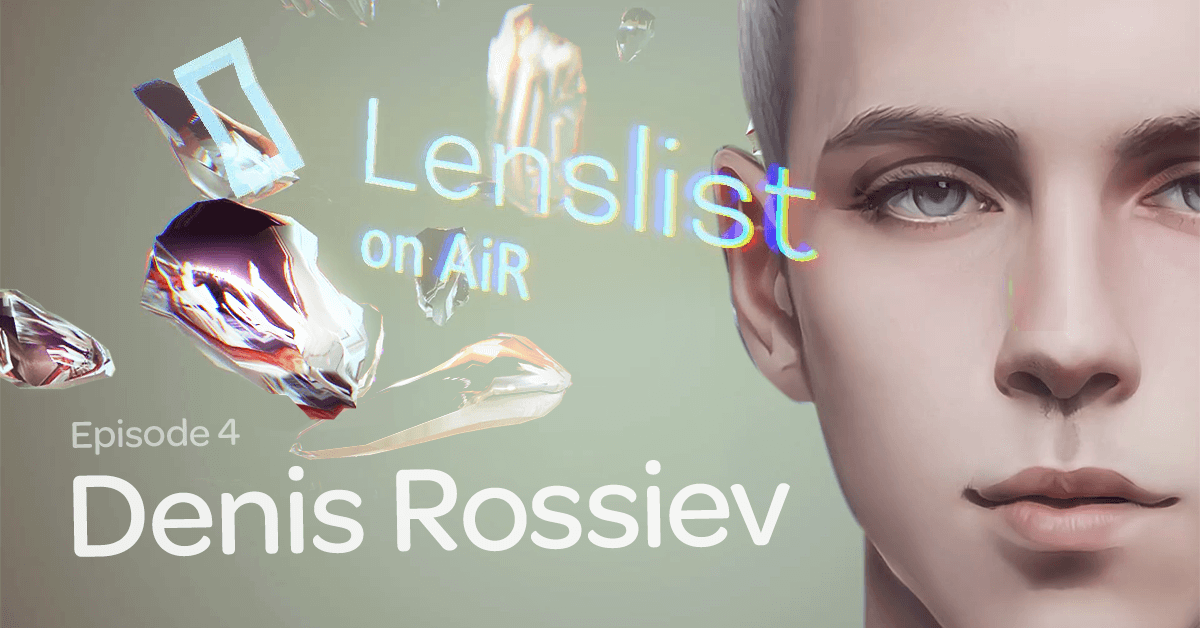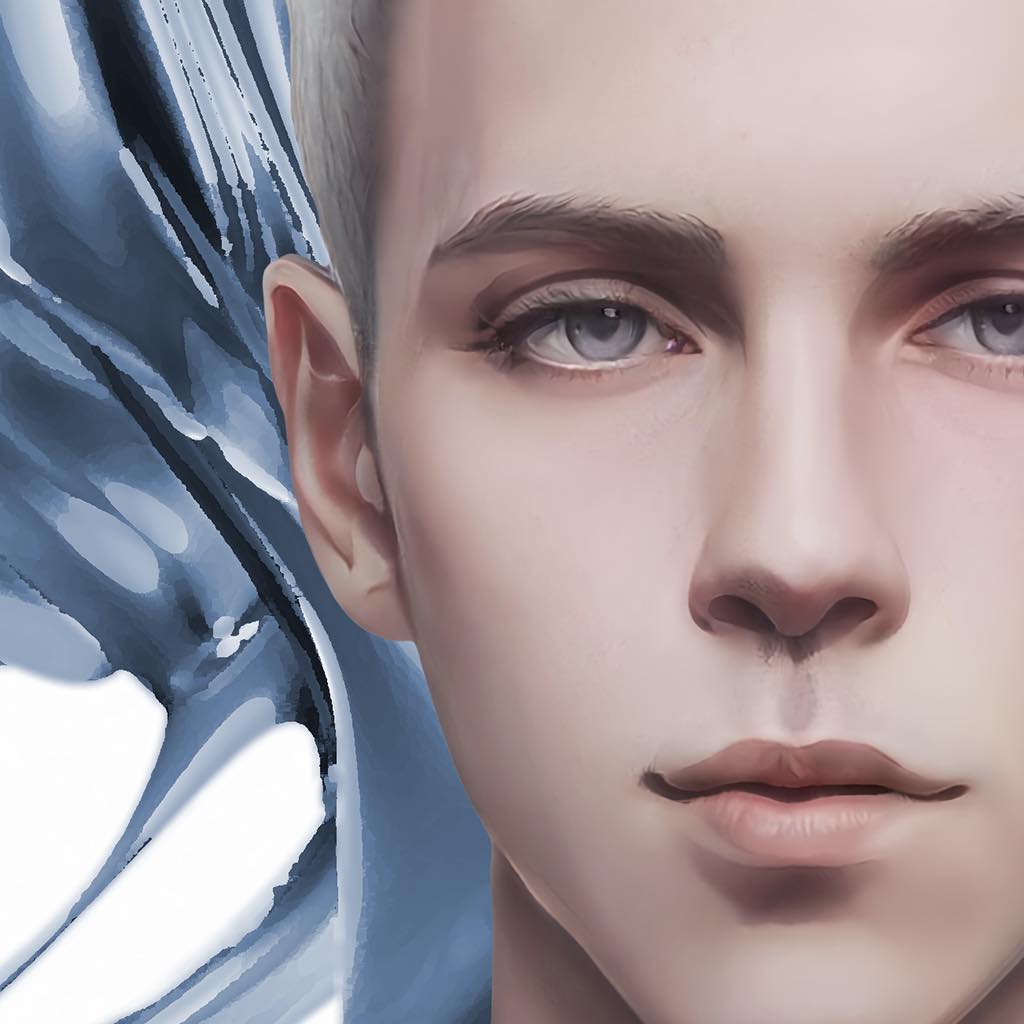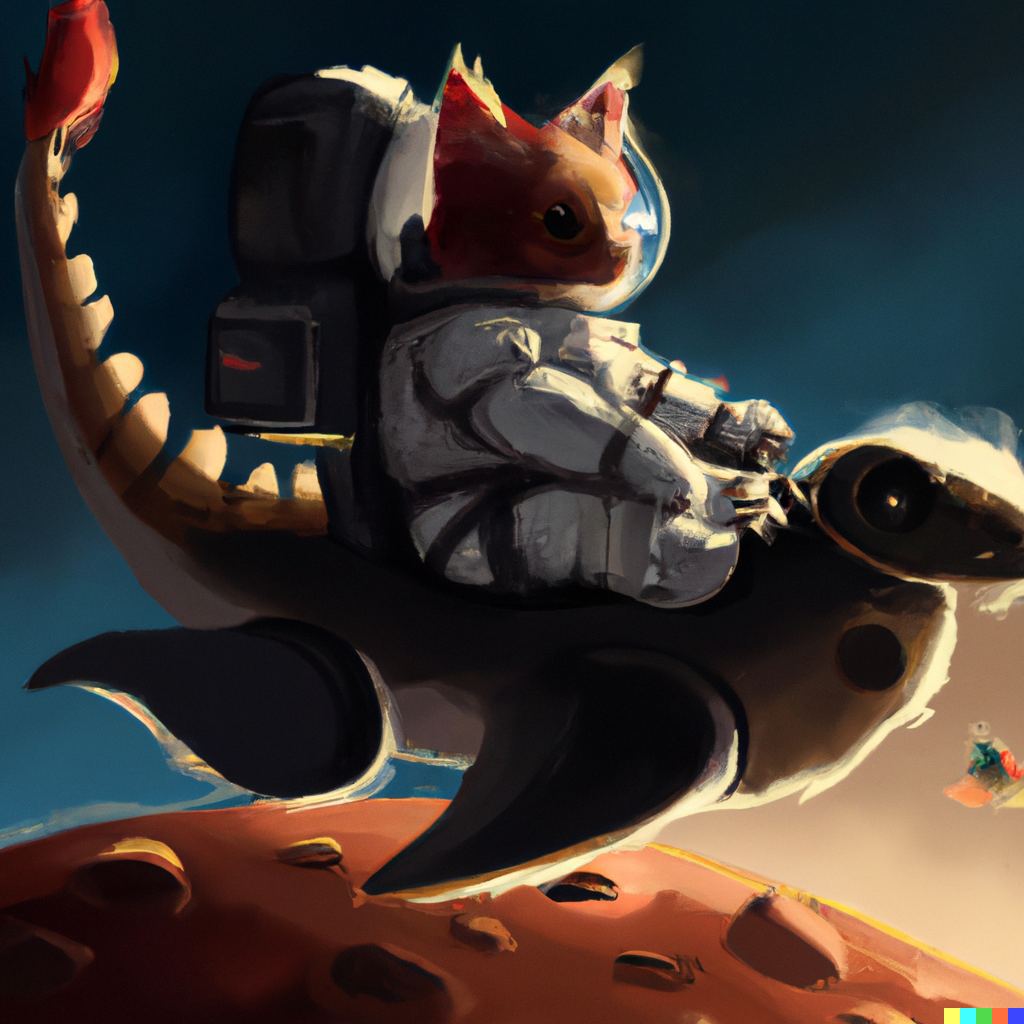Lenslist on AiR | Denis Rossiev

Apparently, success is measured by patience, and every stumble can actually bring us closer to achieving our goal. 🤔 And that is exactly the lesson that our next guest learned! We invite you to another edition of our Lenslist on AiR🎙️ – this time starring the one and only Denis Rossiev, who stole our hearts with his authenticity and creative skills! Dive into an engaging interview about difficult beginnings, moments of doubt, hard work, and, finally, phenomenal results! 🤩
Lenslist on AiR
⭐️⭐️⭐️
I wanted to ask you about your story. Because you know, everyone knows you, and everyone knows that you’re one of the masters in the AR world. But I think no one knows how all of it started. I don’t even know how all of it started. So please tell me everything.
 I was born in Siberia, in a small town, actually. It’s in the middle of nowhere. So I was always obsessed with technology. I love to break things, to disassemble them. Well, actually the same I do today. I disassemble, I break, I hack, I do everything, you know? I even remember how my dad brought black and white laptop. Just imagine a black-and-white screen. It was more than 25 years ago. Also I was obsessed with art, I drew a lot. I also started to code in school. Then I entered a Technical University and I was like, what the hell is going on there. Like some electronic stuff, some physics. I didn’t like it. I quit after a year and entered another university to study marketing, and that was really cool and that was really interesting and useful. So I graduated. I started to work as a graphic designer. As a web developer. What’s next? Then I became an art lead. I had my own business, but all things changed when I saw these Snapchat filters – probably all of you remember them. It was in 2016, 2017 and this dog filter. That’s so cringe, so stupid. But then I thought that this is a spectacular technology inside. I just imagined it five years ago, or it’s seven years ago. It was like magic. It’s a real time for striking that can recognize your face, gestures, and mimics. And I thought, this is really cool, but then I forgot about it for a year or two. And in 2019 I found Spark AR. That was really exciting for me. I tried to start, I started creating, but just imagine at this time there were no YouTube tutorials! At all!
I was born in Siberia, in a small town, actually. It’s in the middle of nowhere. So I was always obsessed with technology. I love to break things, to disassemble them. Well, actually the same I do today. I disassemble, I break, I hack, I do everything, you know? I even remember how my dad brought black and white laptop. Just imagine a black-and-white screen. It was more than 25 years ago. Also I was obsessed with art, I drew a lot. I also started to code in school. Then I entered a Technical University and I was like, what the hell is going on there. Like some electronic stuff, some physics. I didn’t like it. I quit after a year and entered another university to study marketing, and that was really cool and that was really interesting and useful. So I graduated. I started to work as a graphic designer. As a web developer. What’s next? Then I became an art lead. I had my own business, but all things changed when I saw these Snapchat filters – probably all of you remember them. It was in 2016, 2017 and this dog filter. That’s so cringe, so stupid. But then I thought that this is a spectacular technology inside. I just imagined it five years ago, or it’s seven years ago. It was like magic. It’s a real time for striking that can recognize your face, gestures, and mimics. And I thought, this is really cool, but then I forgot about it for a year or two. And in 2019 I found Spark AR. That was really exciting for me. I tried to start, I started creating, but just imagine at this time there were no YouTube tutorials! At all!
I also wonder what motivates you and what gives you what inspires you?
 Actually, most of the things I do, I do just for fun. I started it as a hobby and it became my job. But I still do it for fun. I really enjoy it. And most of my inspiration comes from science fiction. I read a lot of science fiction books. I watched a lot of movies. Now I can create some things I have read about 10 years ago. I dreamed about it and now I can create it and I can see how other people create it. That’s awesome!
Actually, most of the things I do, I do just for fun. I started it as a hobby and it became my job. But I still do it for fun. I really enjoy it. And most of my inspiration comes from science fiction. I read a lot of science fiction books. I watched a lot of movies. Now I can create some things I have read about 10 years ago. I dreamed about it and now I can create it and I can see how other people create it. That’s awesome!
How do you see the future of AR in the whole world and do you think it will change?
 I think that the path of AR is pretty clear – it will become a part of our lives. Like a smartphone. I can give you an example. Like ten years ago, not every person, but a lot of us, had computers. So in the morning we go to school or university or the job. We do our job, we come back home, and spend time with our family. Then we have like 2 hours to spend on the computer, to play games, to maybe do something and that was the start. That was the beginning. But then when smartphones become available for everyone, when the Internet becomes available for everyone, we can connect to it like 24 hours a day, seven days a week. And that changed everything. Because now we can produce content, we can consume content. And AR is the next step because we’re switching to the Metaverse subject. Yeah, I think that the metaverse is the synthesize, the combination of the physical world and the digital world. The shitty 3D games that everyone is doing and running the browser, that’s not this way. We need to bring digital content. We need to bring our digital lives into physical reality. We need to combine them and make our lives better. We need to create some educational stuff, some entertainment stuff. We need to help people with special needs to live a full life, something like this. And all of this is possible with technologies, especially AR. So we’re waiting for the glasses.
I think that the path of AR is pretty clear – it will become a part of our lives. Like a smartphone. I can give you an example. Like ten years ago, not every person, but a lot of us, had computers. So in the morning we go to school or university or the job. We do our job, we come back home, and spend time with our family. Then we have like 2 hours to spend on the computer, to play games, to maybe do something and that was the start. That was the beginning. But then when smartphones become available for everyone, when the Internet becomes available for everyone, we can connect to it like 24 hours a day, seven days a week. And that changed everything. Because now we can produce content, we can consume content. And AR is the next step because we’re switching to the Metaverse subject. Yeah, I think that the metaverse is the synthesize, the combination of the physical world and the digital world. The shitty 3D games that everyone is doing and running the browser, that’s not this way. We need to bring digital content. We need to bring our digital lives into physical reality. We need to combine them and make our lives better. We need to create some educational stuff, some entertainment stuff. We need to help people with special needs to live a full life, something like this. And all of this is possible with technologies, especially AR. So we’re waiting for the glasses.
There is a feature about LiDar right now and if the depth itself is one of the most challenging features, I would say, but still the newest. And I know that you’re very into it. So could you tell me more about this? About how it works, about how to get started with it or whatever?
 First, we need to define LiDar for our viewers. It stands for Light Detection and Ranging. So basically this is a sensor that emits light. The light affects from the surface and comes back. So you know the time when you emit the light. You know the time when it comes back. You know the speed of light. So basically you can calculate the distance between the camera and the object. So the sensor allows the device to see how far objects are from the camera. Basically, you can generate a so-called depth map. It’s a black and white texture and black is nearby surfaces and white is further surfaces. So this is really because the simple camera image is just an image. And that map tells you how far objects are. You can make something like Occlusion, you can achieve more precise tracking and a lot of features. So that’s why I like it so much. I did some awesome research for Meta, and soon all of you will see it in Spark AR.
First, we need to define LiDar for our viewers. It stands for Light Detection and Ranging. So basically this is a sensor that emits light. The light affects from the surface and comes back. So you know the time when you emit the light. You know the time when it comes back. You know the speed of light. So basically you can calculate the distance between the camera and the object. So the sensor allows the device to see how far objects are from the camera. Basically, you can generate a so-called depth map. It’s a black and white texture and black is nearby surfaces and white is further surfaces. So this is really because the simple camera image is just an image. And that map tells you how far objects are. You can make something like Occlusion, you can achieve more precise tracking and a lot of features. So that’s why I like it so much. I did some awesome research for Meta, and soon all of you will see it in Spark AR.
Everyone is recently obsessed with the Dall-e system, the AI system. And thankfully, you’re also obsessed with it, as far as I’m concerned. And how could you actually define the Creator’s role in a situation where the Creator himself or herself can co-create a project with AI? Because it’s definitely something new.
 It’s a revolution. Like four years ago, we had some neural networks that could generate some glitchy, low resolution images. And that was really cheap. But now, for the last three or maybe five months, the AI made the biggest leap, probably for my whole life. For now. I have a lot of neural networks. Probably the most famous is Dall-e. It’s the text image model. Basically, you can type some text like a cat in a space, huge writing in a dragon on Mars, and you will get a picture.
It’s a revolution. Like four years ago, we had some neural networks that could generate some glitchy, low resolution images. And that was really cheap. But now, for the last three or maybe five months, the AI made the biggest leap, probably for my whole life. For now. I have a lot of neural networks. Probably the most famous is Dall-e. It’s the text image model. Basically, you can type some text like a cat in a space, huge writing in a dragon on Mars, and you will get a picture.
This is not an existing art from the Internet. This is not a stock image. The AI can generate an image from scratch. It knows what’s a cat, it knows what’s a Mars, it knows what’s a dragon, it knows how something looks written on something. And AI can combine this knowledge to create an absolute image from just a text prompt. And this is crazy. The quality of the image is perfect.
 Created in Dall-e by Denis Rossiev
Created in Dall-e by Denis Rossiev
Do you have to type the special search or just does it work? Like, if I put there, like, cat face and lights, will it generate the perfect picture like you showed us right now? Or does the search need to be more specific?
 It needs to be specific. I can proceed that a professional code prompt engineer will be assumed. The idea is you have to know how to type. You need to know how to ask an AI, because it’s actually the same as working with a human artist. You need to explain what you want. So the same design, the prompt can be short, it can be long. You can specify digital art. You can specify the lens, focal distance or anything, colors, shapes, composition, you can specify all of these and you need to know how to do it.
It needs to be specific. I can proceed that a professional code prompt engineer will be assumed. The idea is you have to know how to type. You need to know how to ask an AI, because it’s actually the same as working with a human artist. You need to explain what you want. So the same design, the prompt can be short, it can be long. You can specify digital art. You can specify the lens, focal distance or anything, colors, shapes, composition, you can specify all of these and you need to know how to do it.
Okay, so moving to another question about the Metaverse itself, of course, I’m very curious. How do you see yourself as a Metaverse citizen? Tell me more about this one. Will you be just an inhabitant? Will you be a Creator of it? Will you experiment, explore, or just live, Just chill?
 I’ll definitely be a Creator. I’ll definitely try to be in the front team. I’ll try not to just create the content, I’ll try to educate people, to show, in a right way, what Metaverse is. It’s not like browser games, it’s a synthesis of the digital and physical world, you know.
I’ll definitely be a Creator. I’ll definitely try to be in the front team. I’ll try not to just create the content, I’ll try to educate people, to show, in a right way, what Metaverse is. It’s not like browser games, it’s a synthesis of the digital and physical world, you know.
What advice would you give to young Creators? To the ones that are just starting? Because so many years have passed in the AR and in your career… What would you say to them?
 I believe that the most important advice is to never give up. Sometimes when we’re trying to create something – and I’m not an exception here – and we open Instagram or Facebook and we see hundreds of amazing filters a day and we think “I didn’t do anything today, I can’t achieve this level”. And then I understand that I’m only one, and there are thousands of Creators out there, and each of them does only a little part of the job, and then we see the big part, everything at once, and that’s why I start thinking that I’m so small too. But we should never worry about them, never give up, continue creating, try to learn new tools, AI, everything.
I believe that the most important advice is to never give up. Sometimes when we’re trying to create something – and I’m not an exception here – and we open Instagram or Facebook and we see hundreds of amazing filters a day and we think “I didn’t do anything today, I can’t achieve this level”. And then I understand that I’m only one, and there are thousands of Creators out there, and each of them does only a little part of the job, and then we see the big part, everything at once, and that’s why I start thinking that I’m so small too. But we should never worry about them, never give up, continue creating, try to learn new tools, AI, everything.
⭐️⭐️⭐️
We would like to thank Denis for this amazing interview! 🥰 It was truly a pleasure, as well as a solid dose of motivation! 💪 What we can learn from his story is not to lock ourselves in one mindset, to broaden our horizons all the time, and not to be afraid to ask for help. That is why we are very happy to be a part of such a wonderful Community of Creators! 😉
We hope you enjoyed it, stay tuned for more! 💜
